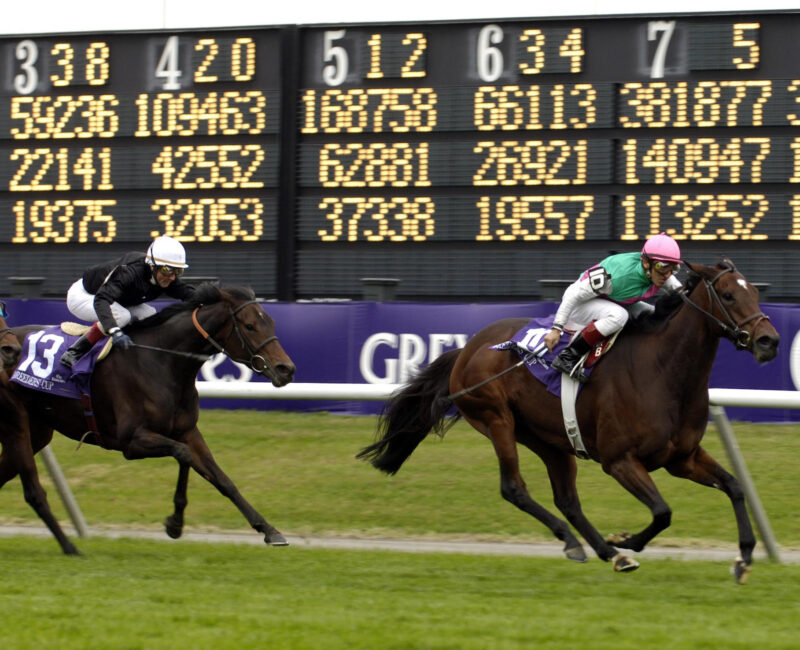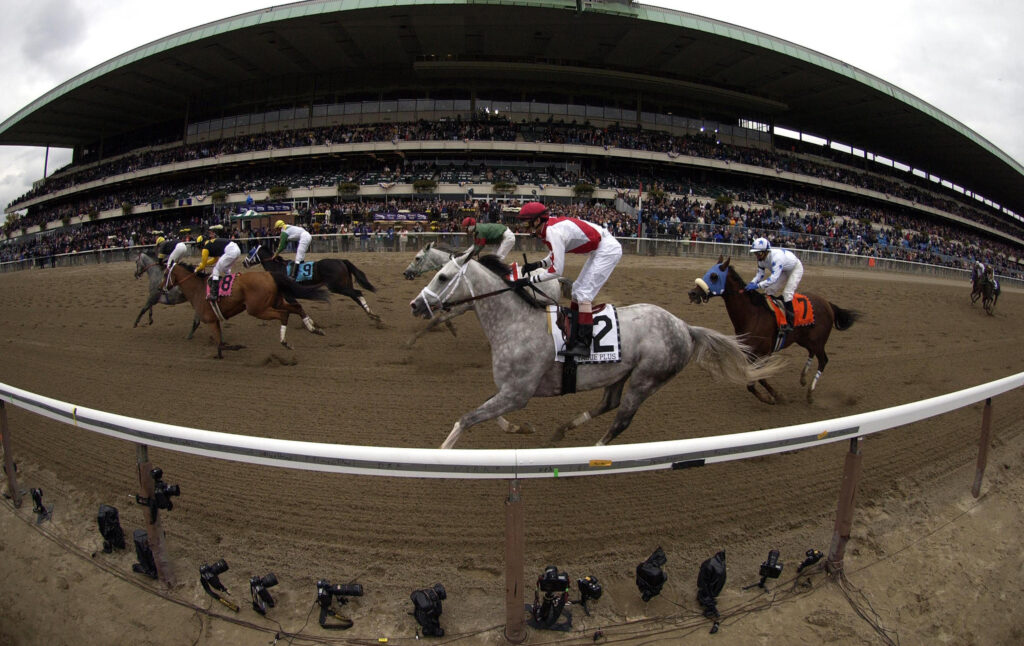
Belmont Park, New York
Peter Welcome to our travel podcast. We’re specialist travel writers and we’ve spent half a lifetime exploring every corner of the world.
Felice So we want to share with you some of our extraordinary experiences and the amazing people we’ve met along the way.
This week, we’re exploring the world of horses with writer, Colin Cameron, who has an intimate knowledge of studs and race courses across the globe. He used to be a gambler until the day he bet everything he owned on the Derby and won. Colin, tell us how your love affair with the turf began.
Colin I’m an author, a writer, and I also curate events and gatherings such as debates and salons where someone comes to the lunch table, to the supper table and shares their views. But that’s sort of the evolution from racing, which is where I started my writing career. I had no interest in horse racing at all as a child or growing up.
But when I was in my rooms in Cambridge, I decided I needed to have a little bit of an edge to my otherwise dull and benign personality, and I thought being a gambler would be quite cool, especially with women. I was completely wrong about that…entirely. On the back of that, I did begin to follow the racing and developed an interest in it, sufficient that I could end up writing about it. This is the subject I started writing about.
Peter Were your family interested in racing?
Colin Not at all, and most distressed by this this sudden affectation. Particularly because after I graduated, I went on a year’s walkabout to South America, Asia, Australia and Africa, visiting racecourses and studs so I could learn about the business in a way that meant I could represent myself to editors as someone who had a perspective that otherwise wouldn’t be available. This didn’t seem like a very good plan, especially to my father who wanted me to go and qualify as an accountant, which was good advice looking back. But I was undeterred. But it did mean that I saw the world of racing in a way that I think few others have, even today.
Felice Were you keen on riding as a child?
Colin No, I’ve got a little bit of an allergy to horses, but I always equate it to boxing – you can be very keen on boxing, but have absolutely no inclination about stepping into the ring because you can get quite badly hurt in the ring. And similarly, horses are 500 kilogram beasts and you need to know what you’re doing on them. And I wasn’t really prepared to take those risks.
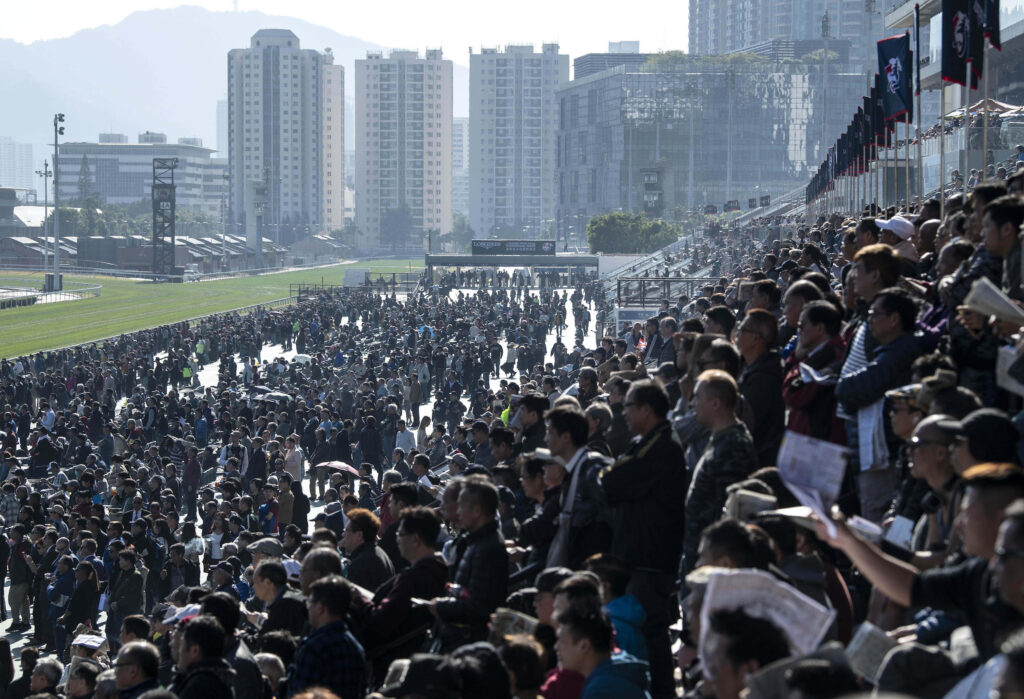
Racegoers watch the Hong Kong Sprint, Sha Tin. Photo: © Edward Whitaker
Peter Can you actually ride?
Colin I rode when I was five or six, but I don’t think that really counts. I think I probably could ride if I was required to ride. If you gave me six months, I could probably knock myself into shape. Doesn’t mean I don’t criticise jockeys, of course, because there are many jockeys in the grandstand, many more jockeys in the grandstand than there are on the Whangarei. In fact, I’ve always found that if I’m at a stud for more than a couple of hours I begin to sniffle a bit and sneeze. And I imagine that’s because I just don’t really agree, particularly, with the animals.
But I didn’t mean that travelling around wasn’t very exhilarating. And they are such noble animals. I mean, to some extent I wouldn’t sit on the back of one out of a respect for them because they are literally thoroughbreds. I mean, we use that word thoroughbred to describe many things. But obviously a horse is one that’s been bred for a specific purpose.
One of the funny things about the travelling in my year off was that I was visiting racehorses and studs, which generally speaking are populated by the affluent. But I was staying in youth hostels and some pretty grim digs. I had a suit that I would put on when I was going to the races, but otherwise I would be wearing the standard sort of year-off gap student wardrobe. And so I would morph into this relatively respectable visitor from England and I’d be treated quite regally by the owners and breeders in places like South America and especially Asia. I don’t think they realised I didn’t have a pot to do whatever one does in a pot.
Felice How did you know which racecourses to visit and which studs? Did you read about it before you went?
Colin Yes. The international racing calendar is well circulated and almost every country has a race course of some sort. So it wasn’t particularly difficult to find out where they were. A lot of them obviously on in relatively near built-up conurbations, as you’d expect. And there was also a company called International Racing Bureau, which was quite helpful in giving me a steer to the more obscure places. But often I would arrive in a country and then find the racecourse from there. I mean, you could imagine if you arrived in Britain without knowledge of where any of the major race courses were, within a very short period of time you could acquire that knowledge.
But the most odd thing was I would be, by day, a relatively respectable, suited and booted follower of the turf. And then by night I would be in some fairly squalid bedsit or youth hostel, amongst other travellers and the conversations: ‘What did you do today?’ were rather incongruous because I obviously wasn’t really visiting any of the sites or anything like that. My passage was entirely based on where the major studs were and where the racecourses were, which is a little strange.
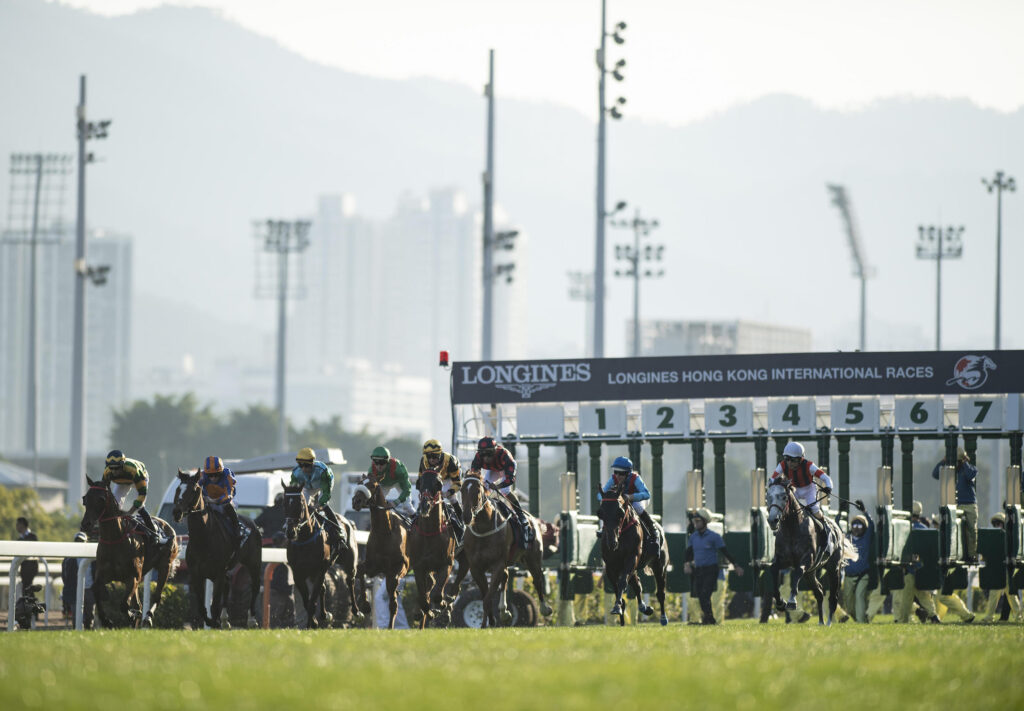
The Hong Kong Cup, Sha Tin. Photo: © Edward Whitaker
Felice And what did you do after your year of travelling around?
Colin When I came back and got a job on a new horse racing magazine called Racing and Breeding Update International, and I was their photo filer. And from there I was given the opportunity to write little bits and pieces here and there, and gradually I grew from that base into having a body of work. So racing was very good to me in that respect. And I’m not saying the plan to acquire this international knowledge proved particularly useful, but it did at least mean that I stood out.
I worked on a news desk there, and because I’d been to Chile, I was given the name ‘Chile’ – because I was deemed to be particularly laid back and almost asleep sometimes around deadlines. So I like to think that all that travelling at least came something worthwhile.
Peter So if you follow the international calendar, it’s fairly well marked out, isn’t it? I mean, there’s Royal Ascot, the Melbourne Cup and there’s Happy Valley. There’s all these things around the world. Do you just follow the seasons?
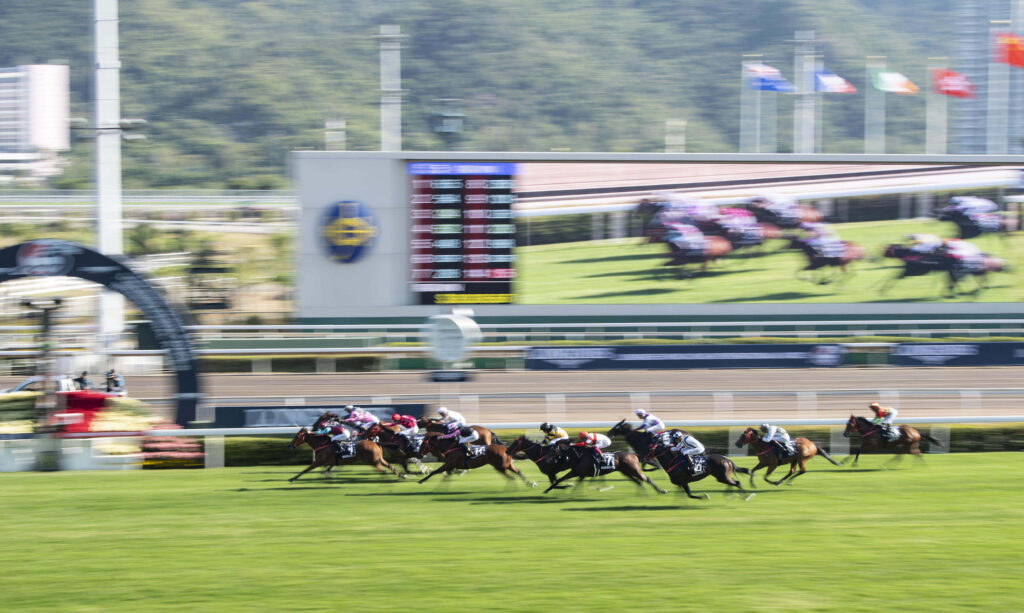
The Hong Kong Sprint at Sha Tin. Photo: © Edward Whitaker
Colin Well, there’s racing in Australia, for example, all year round. They would be racing in Hong Kong for most of the years bar a very short break, in South America, in the US, Canada, it’s an all-year-round thing. But you can pick out the high points: the Melbourne Cup is in November, so that could be one destination.
There’s a very big international meeting in Hong Kong in December, there’s a very significant international gathering that moves around America in October. So you could do the States in October, follow the earth round to Australia and have Melbourne in November and then head off to Hong Kong for the races in December.
Felice So are there are many people that go round like this, going to lots of different ones?
Colin If you own a horse, you would be most likely to follow it. And if you had a horse good enough to run in Hong Kong, for example, the cost of that would be significant – five figures. So adding on a trip for yourself wouldn’t be a significant extra cost and would be the whole point of having a horse. These race, of course, is bringing together the best of the best. They’re like little World Cups or little European Championships or Olympics. So they do attract racing fans. They want to experience what they love in a slightly different culture and environment.
Felice Do you have any favourite race courses in the world?
Colin I quite like Ascot in Perth, which is not quite Ascot in Berkshire, but it has some of the pomp and ceremony, albeit Australian-style. The Club Hipico in Santiago in Chile is a place I have great nostalgia for, because it was probably the racecourse where I first got the sense that I might become a writer – because I was very well looked after by the main racing correspondent of the El Mercurio newspaper there. So I was allowed into the press room in the press area and I began to see what covering racing would be like. That would be one of a very soft spot for.
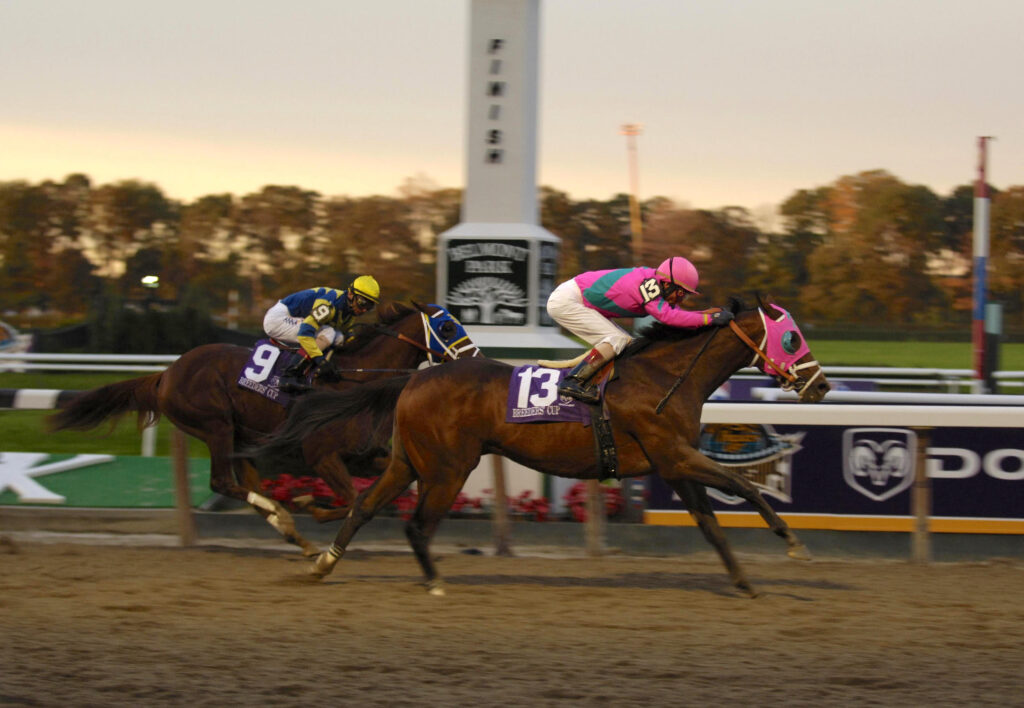
Belmont Park, New York
Also Belmont Park in New York – it’s actually just outside of New York City – and was treated in the 19th century as somewhere where the good people of Manhattan would go for a bit of country air. I did a story there with a photographer who insisted that we get up at 4am in the morning because the light in the autumn in Belmont Park was best at about 5.30. And a place like that is magical because the horses in America are trained at the track, so you get to see a whole world that’s stirring before most of the city’s even had their first alarm call.
Felice What about the most unusual race courses?
Colin Well, in Hong Kong there are two racecourses. There’s Happy Valley, which is in the centre of town and it’s absolutely reflective of the kind of hustle and bustle that Hong Kong is. But there is a second race course in Hong Kong called Sha Tin, and that’s on reclaimed land so it’s, in a sense, a racecourse out of nothing. I mean, there’s no right really to be anything there, let alone a race course. And there they have things like multi-storey stables.
Horses are given a berth, which might be on the third or fourth floor and they have horse lifts. So the horses get very good at walking into the lift and going up. I don’t know whether they actually push the button; they probably get a stable lad to do that, but it’s a phenomenal feat of engineering and architecture, and it’s one of the best race courses in the world. Many people say that the current Ascot in Berkshire – the Royal Ascot which is owned by the Queen – the designs of that are largely mirroring the work that they did in Sha Tin.
Peter And what about Royal Ascot? That’s a sort of grand fête every year. The quality of the racing is good though.
Colin It is truly the best racing in the world over the five days. I mean, Americans come to Ascot even if they haven’t got a runner, because it’s a wonderful opportunity to see the absolute very best horses run. The Royal Enclosure, where you have to wear morning dress and ladies have to wear hats, is one of the best marketing tools ever created in sport because it’s only about 7,000 of the total crowd, which can be up to 80,000.
But the spectacle that it provides draws in a huge number of people who want to be there and be part of it, even though they’re actually excluded by extremely officious men in a bowler hats who check your badges to make sure that you can’t breach the citadel.
Felice Are there any other courses where you have to have special dress?
Colin If you want to be in the Queen’s Stand at Epsom on Derby Day, you have to wear morning coats and top hats. So those would be the only two. I can tell you from personal experience, the journey by public transport from north London to Epsom on Derby Day is quite a challenge if you’re dressed up in that particular garb.
There’s a great story about somebody who had a runner in The Oaks race and got a train to Epsom, and won the race and had to get the train back and took the trophy back with him on the train. And he was asked by some fairly inebriated punter on the way back whether he’d had a good day. And he couldn’t really say that underneath his coat he actually had the trophy for The Oaks.
Felice And have you met any of the great racing personalities?
Colin Well, I’ve met Lester Piggott, but the circumstances were rather unfortunate because it was the moment of his trial for tax evasion, one of the few contests that Lester Piggott lost. But he, of all the people in racing that you could wish to meet, would be the ultimate. He’ll never really speak to you. He’s a very introverted, withdrawn man, but he has that aura the great sportsmen have. Even if he is silently in the corner of a room, the whole room gravitates towards him. And if he so much as says a single word about a horse, there’s a state of great excitement that prevails, because it’s almost of biblical proportions his insight. So if Lester would mention a horse by name, there would be a sort of frenzy in the betting market.
It’s strange because most of our iconic sportsmen are athletic and Adonis-like, but Piggott is obviously not that at all. He’s spent his whole life starving to keep his weight down to the absolute bare minimum. So there’s nothing physically striking about him but put him on a horse, put him in the saddle, and he becomes an extraordinary poetic figure.

Peter What about gambling? Are you a big gambler yourself?
Colin I don’t gamble actually. I did gamble and had an extraordinarily successful couple of months, culminating in a huge triumph for the 1989 Derby. If you look at the footage of that race, in the middle of the track after the horses have passed the winning post, there’s a man in a top hat kneeling in the way that Robert De Niro does in The Mission – because the horse that has just won has made him an extraordinarily large amount of money, in those days and today.
But after a month of gambling like a maniac on the back of that, I lost about maybe 10% of what I’d earned, if earned is the right word, and realised that if I carried on in that rate, I would be broke again in 10 months’ time. So I took the view that I’d had my day in the sun and I should probably pull up stumps. And I literally haven’t had a bet since then.
Peter It must be quite a traumatic moment, saying to yourself ‘I’m not going to gamble again.’
Colin The most traumatic moment was the night before the race, getting a phone call and being told that the horse that carried my whole life had trod on a stone and might be scratched from the race. The winning of the money and then losing the 10 percent was actually quite enjoyable. But I would say that had that happened to me last year, there are so many more ways in which you can bet these days I would have got through the money much, much faster.
But fortunately, back in 1989, which is the year when I had my big win, it was actually quite hard to bet prolifically. And for example, in a casino you had to wait 24 hours before you were admitted and had what was known as a cooling-off period. So it was a learning experience, but it was quite fun, much more fun than school, certainly.
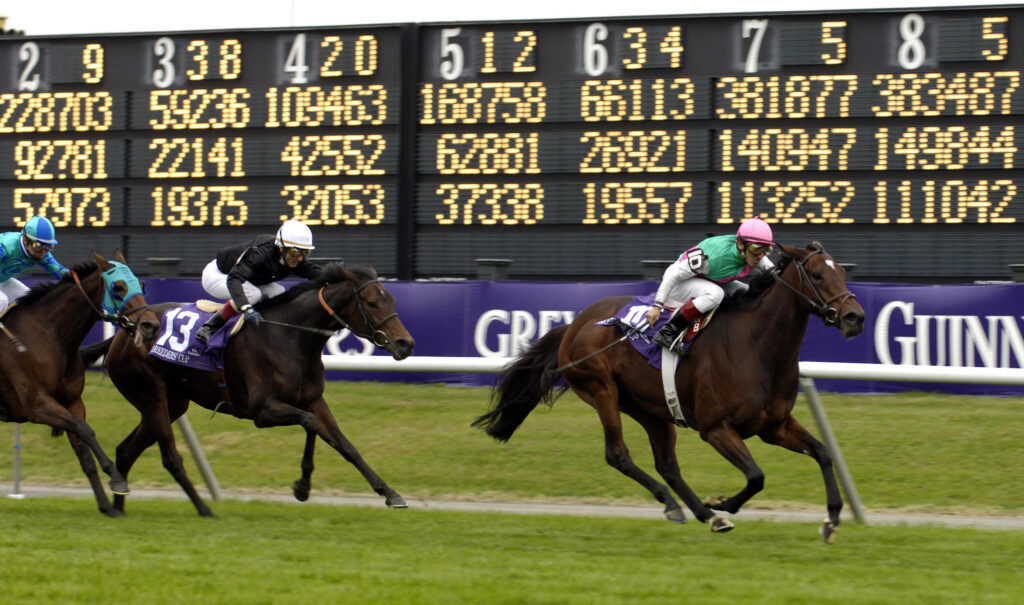
Belmont Park, New York
Felice And do you tend to go to races and try and look at the horses up and down to guess which ones are going to be the winners?
Colin Well, there’s a sort of buoyancy, a physical buoyancy in a horse, which anyone can see. And the key thing obviously is seeing what the horse looked like last time and the time before, because you need some kind of benchmark. What I would say…going back to betting briefly…is that I was able to sustain an even deeper interest in racing when the triviality of betting was taken away, because the horses are far more interesting than the money you might make on them.
They’re absolutely beautiful animals. And to be able to savour them for what they are and accept that the one that finishes second has in no way let you down, means that you can begin to really love the sport. Whereas if you’re betting there will always be a part of the game that you’ll see through that prism.
Peter Betting has changed a lot over the years, hasn’t it?
Colin Is has transformed. The emergence of online betting has transformed the game completely. I wrote a book on the history of Betfair. Betfair is the first betting exchange, the person-to-person opportunity to bet and that launched in 2000 with the arrival of broadband. And that has transformed betting, because there’s absolutely no need now to go to the high street and the number of betting shops in this country is in freefall.
Peter Is there a danger of some people in the privacy of their own home betting far more than they can afford?
Colin I mean, obviously, pathological gambling is a serious problem. If you’re of a personality that can’t handle the process of gambling, then you can very quickly make your way to ruin. I would say that online betting is a little better at addressing pathological gambling, because it’s much easier for an online bookmaker to see patterns in betting emerge. And that means an ethical online bookmaker can identify a pathological gambler or the beginnings of that mental state and can then intervene.
Whereas if you’re on the high street walking into a betting shop – you can be banned from that betting shop but there will probably be one 200, 300 yards away, which you could then go to. So while there were many more opportunities to bet now, to some degree they’re better policed. And bookmakers will always say, truthfully or otherwise, that a bad punter who gets his way or her way to ruin is bad for business because it doesn’t do the betting industry or its reputation any favours at all.
Felice What happens at racecourses where there is no legal betting, like in Arab countries, presumably?
Colin Well, in Dubai, for example, there is no betting infrastructure. I suspect if you’re ingenious, you could probably get the money down. But what they’ve done there is they’ve created competitions where you would pick the winners of the evening six races, say, and enter your selections into a competition. And if you come out top, you win a car. Now I think that satisfies the teachings of the Koran as to be non-betting. And it’s quite a clever way and it actually means that you’ve got less skin in the game, a safer amount of skin in the game. So there’s perhaps some lessons to learn here.
The problem is that racing is subsidised by betting. That’s the economic model of racing – that people bet on it and a proportion of that goes towards funding the sport. And that goes all the way back to the beginnings of the sport in the 18th century, where two people would put up their horses to compete against each other and they both put down, say, a thousand guineas each and the winner would take all.
So even in the origins of racing or formal racing in this country, betting was always around it. In Dubai, obviously the Maktoum family can subsidise racing, which is what they do, which means that they therefore don’t have the need to or don’t have the requirement to have betting to bankroll the occasions.
Felice You mentioned to me before that there was a link between racing and other pursuits, and things like the landscape and architecture, history?
Colin I think horse racing is actually part of the national curriculum in some respects, not mathematics and gambling, parents will be reassured to know, but in terms of history. Because it was started, racing was formalised, in this country by Charles II and you can plot the royal involvement in the sport from back then through to the present day. So it’s not a bad way to learn kings and queens of England from the 18th century.
Architecturally, you can look at race courses and you can see from when they were built how they reflect the styles of that age. Longchamp in Paris, for example, which has just had a rebuild, used to be a wonderful example of Parisian architecture from the 20th century.
And culturally, you could imagine the food that’s consumed at racecourses – the Epsom Derby is famous for its jellied eels, which is a reflection of it being a bit of a day out for south London. Again, back in Paris there are various saucisson offerings that you can get in the cheap enclosures in Paris. Because racing s attended by the great and the good all the way down to the great unwashed. So it is a gathering of society as a whole and the Epsom Derby absolutely embodies that.
Peter What about the Queen? She’s a passionate horse owner and she’s been racing all her life. Tell us a bit about that?
Colin And betting, I think, as well. I think she’s quite keen on full immersion into the sport. Well she owns Ascot; it’s not always really known that is her course. So her involvement is both as a purveyor of the sport and also a participant. I mean, she’s genuinely enthusiastic about the game and the loveliest time to see the Queen racing is not at Royal Ascot when she’s in the carriage procession, but to see her at Newbury where she’s got a runner in a fairly nondescript race on a Thursday afternoon and she’s just decided that she’d like to go.
And the journey from Windsor to Newbury, especially when you’ve got outriders, is relatively untroubled. And when you see her there, you can see her a real love of the game. And it is a genuine passion. I’ve never had any direct dealings with her, but it is said that she’s very knowledgeable. The royal involvement is very important to the sport, no question about it.
Peter And presumably some of the smaller, lesser-known racecourses around Britain, which there are an enormous number, are really good fun to go to?
Colin I mean, Cartmel on a Bank Holiday Monday pulls in about 20,000. And it’s a proper local event where everyone turns up, because that’s what one does on that particular bank holiday in August. And I say that the vast majority of a racing crowd comes from within 40 minutes’ travel from the racecourse.
So that’s why you get such a local crowd. I mean, these are known as Garth tracks, and there’s nothing special about them at all. They’re a little bit more organised than a couple of flags in the ground because betting requires things to be done above board and for the results to be legitimate; but they have a quaintness. And one of the beauties of British racing is that there are there are around 60 tracks and they’re really all different, they all have their unique qualities.
Peter Tell us about racing in America.
Colin It’s much, much different because it’s largely on dirt and that means that they don’t have to rest the track. So you’ll have maybe a month’s racing at one course, day after day after day, and when that month is scheduled, all the trainers and all the horses and all the morning riders and jockeys will come and reside there. Like I was saying, at Belmont Park it’s like a traveling circus. It’s a colder experience because there isn’t that sense of it being three days and then nothing for three months. There is a little bit of fatigue that can set in.
At Belmont Park in February or Aqueduct Racecourse in January in New York is pretty cold and pretty bleak, and the crowd is not exactly running into the tens of thousands. I think of those race meetings as being a bit like baseball, where you have a practically empty stadium and the pitcher and the batter just almost going through the motions. It is very much part of American life without it being particularly spectacular or overstated and on an extraordinary scale, too. I mean, there are hundreds of race courses throughout America.
Peter And what about Australia, where they will bet on anything – two flies out the window pane?
Colin They, as we speak, probably betting on something, they’re probably betting on the length of this podcast. I mean, again, there is the sort of majesty of Melbourne and Sydney and Perth, and then they have these country track – places like Geelong, which are not big conurbations, but again, they have a racecourse there because it’s something that can bring the community together.
Peter And at Geelong you don’t wear a morning suit?
Colin You could. I mean, there are some people that wear morning coats for the Melbourne Cup, but by the end of the day it’s pretty messy there. So you have to dress really in battle fatigues, probably the best thing, a khaki outfit is probably the best thing to do.
Peter And there’s a certain amount of alcohol that goes into racing. Alcohol consumption and racing tend to go together, don’t they?
Colin Well if you have seven races and you have a drink after the race, then you can do the maths yourself: race, drink, bet, race, drink, bet. But that means seven drinks, seven bets seven races. You probably also drink at speed, you may also drink in nice warm weather, or you might be drinking to stay warm. So yes, I would say horse and carriage, I would say racing and alcohol, and that might be reflected in the sponsorship.
Felice So if someone wants to own a horse, a racehorse, how much would that cost?
Colin It could cost 13 million dollars. Or someone could be glad for you to take them off their hands. I mean, you could go to Tattersall’s or Goffs in Ireland or Agence Francaise in France and turn up at an auction and buy a horse and walk away with it – there’s nothing stopping you doing that. And you might then have to very quickly find a stable or somebody who knew what to do with it. But there are very few barriers to entry other than having the money.
But it can be very cheap. You could join a racing syndicate, for example, which could be as little as sort of £50 a month. Or as I say, if you’re one of the sheiks or one of the high rollers from some industry, you could spend literally tens of millions on horses. Qataris are very big players at the moment; the Maktoum family from Dubai are serious investors; the Aga Khan has spent a lot of money on the horses over the years.
Peter Then back at home, you can buy a bit of a horse, a leg or two legs, can’t you?
Colin Sure, there are ways in which you can have a taste of ownership. The problem is, is that once you’ve bought the horse, you’re then looking at probably 15 to 18 grand a year to have it trained. And that’s not extravagant at all, that’s pretty basic because horses eat quite a lot and they need a certain amount of space, both to rest and to exercise, and they need certain amounts of veterinary attention. The actual maintenance of a horse is the same, whether it’s the slowest horse in the world or the fastest. So unfortunately, you can spend a lot of money on a very slow horse and that can make the sport rather expensive.
Felice Going back to the history of racing, when did it actually stop being the sort of sport where anyone could get on a horse and take part?
Colin It sort of became formalised near the end of the 18th century. All that happened was that people began to get pleasure from it and it went from being largely match races to contests of three, four, maybe five or six. It became a spectacle so people would come just to watch it. And that meant people began to see it as representing an opportunity. So you would have people offering to ride horses and then you have the emergence of the professional jockeys. And that happens slowly but surely throughout the 19th century.
Felice So if you own a racehorse, it’s a good excuse for travelling throughout the UK, let’s say, or America if you own a horse in America?
Colin You could follow the horse, yes. And the whole expensive horse is significant. And it would seem to be to me, quite churlish to have gone to the trouble of buying one and invested in looking after it, and that they’re not going to go and see it run. It would be a bit like if your child was in private education, not going to the sports day. They obviously want to be there to see if Jemima or Jonathan got a medal for the egg and spoon or whatever, whatever race they were participating in.
And the excitement of having a horse good enough to race abroad is that you feel a little bit like you’re representing the nation. So when the Newmarket Stables have a runner in France in October for the Arc de Triomphe, it is very much as it would be when England were playing France at rugby. It would be seen as an opportunity to go there and bring home the Prix de l’Arc de Triomphe trophy and the prize money for the nation. So if you’re the owner of that horse, you could imagine you would begin to feel that it was your calling.
Peter Now, you’ve written a number of books about racing. Tell us about those?
Colin I have written a book on Betfair, the history of Betfair. I wrote a book called Dawn till Dusk, which is about people who’ve worked their entire lives in the racing industry, people who’ve spent 40, maybe 50 years working at the coalface. So I spent a lot of time with ten people who had that kind of commitment to the game. And it was very educational to see their passion for the sport even after having spent a lifetime in it.
It did reaffirm my view that horses are to be treated with a great deal of respect, because some of them can have quite nasty habits. A lady showed me some terrible scars did she have on her shoulder where the horse kept biting her, and I asked her: ‘Why do you keep going back to the stable?’ and she said: ‘I just love it, I can’t keep away from it.’
Peter You must have seen some life-changing events come home or indeed not come home?
Colin The 1989 Derby in Nashville where I won a decent sum was sort of life-changing money for me. I do often wonder what would have happened if there was a pizza because that would have been life changing in a different way altogether. But I had a big party; I took the office out for lunch. I went on a month’s holiday down the Amalfi Coast and then down to the south of Italy and back up by train, culminating in arriving in Paris for the Arc de Triomphe. So I like to think with betting winnings, you have to spend them as if they’re ill gotten gains. You mustn’t treat them as real money, you must treat them as money that needs to be disposed of as quickly as possible. And that makes it a bit more fun.
Peter And you did a good job of that with before you saw the light?
Colin Exactly, before I did the maths. I studied economics at university so I could work out that the medium term projections for me as a gambler were not particularly favourable.
Felice Where do you see yourself in the next five years? Will you be writing about racing or something else?
Colin The thing about racing for me is it’s been incredibly good throughout my life, even though I’ve left it a little bit and it’s not something I’d write about now full time. But I treat it as a little bit like the village where I grew up, where I’m always welcome when I return. And they’re always quite keen to know what I’ve been up to.
But what racing has been to me is an extraordinary route to the great and the good, because you can meet people at the racecourse who you wouldn’t have a cat in hell’s chance of meeting in the City of London and have a chat with them about their horse. And that means you become their friend for life. And then if in future dealings you have reasonable need to call upon them, they’re far more amenable to you than might otherwise be.
Peter So if anyone wants to buy your book, find out more about you?
Colin I’ve got Instagram, as everyone has to these days, Colin Cameron83, and my books would be available at all good bookshops.
Peter Colin Cameron, thank you very much indeed for talking to us. And we wish you the very best of luck in the future with your career.
Colin That’s a pleasure. Thank you for having me.
For a completely different kind of horse racing, click here.
Felice That’s all for now. If you’ve enjoyed the show, please share this episode with at least one other person! Do also subscribe on Spotify, i-Tunes or any of the many podcast providers – where you can give us a rating. You can subscribe on Spotify, Apple Podcasts or any of the many podcast platforms. You can also find us on Twitter, Facebook and Instagram. We’d love you to sign up for our regular emails to [email protected].
© ActionPacked Travel

- Join over a hundred thousand podcasters already using Buzzsprout to get their message out to the world.
- Following the link lets Buzzsprout know we sent you, gets you a $20 Amazon gift card if you sign up for a paid plan, and helps support our show.

